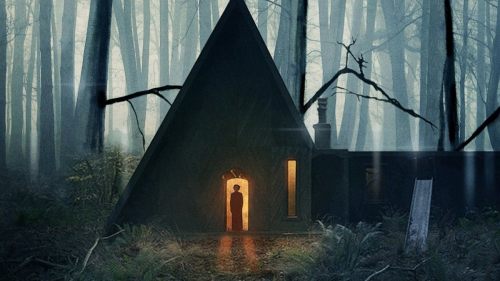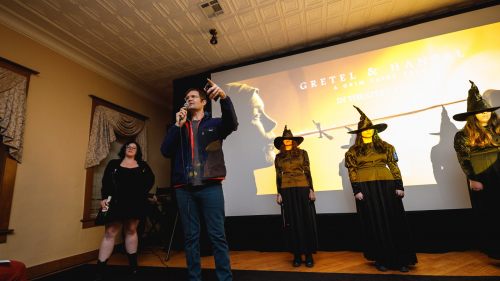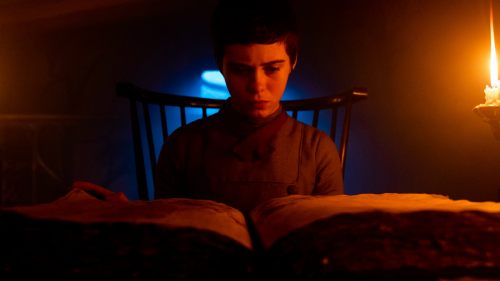THE BLACKCOAT’S DAUGHTER: Satan is the Worst BFF Ever
Gretel & Hansel is almost here. Get your tickets now!
Kiernan Shipka just can't catch a break. Before he was pestering her to sign his book in Chilling Adventures of Sabrina, Satan was being the worst friend ever in The Blackcoat's Daughter; hanging around in the shadows where only she could spot his horns looming, whispering in her ear, and enticing her to cut off people's heads and worship him in, er, a basement boiler room.
Actor-turned-director Osgood Perkins' moody debut is deliberately disconcerting, utilizing a non-linear timeline and two actresses playing the same character who look nothing alike aside from sharing the same haircut (a neat touch that's only noticeable once you know what's really going on), to tell a story of loneliness, despair, and devil worship. So, regular teen problems then. The Blackcoat's Daughter could be taken as a drama about a boarding school misfit, a subtle warning to parents about the dangers of the dark arts, or a movie about the horrors of being a teenage girl. Hell, it’s reasonably all three.
Neither The Blackcoat's Daughter nor the film's variant Euro title February makes much sense in context, though events do take place in February so that's something solid to cling to amidst the murkiness. Perkins' intention seems to be wrong-footing us at every turn. Right from the outset, with the simple utterance of "Daddy, you came early" to an unseen figure in a dark coat (a similar representation of Satan to that in The Witch), which seems inconsequential, there's a sense of foreboding, of something being not quite right.
The premise of Perkins' film is simple enough; two young women, Kiernan Shipka's freshman, Katherine, and Lucy Boynton's queen bee, Rose, are stranded at their snow-covered school over the holidays when neither girl's parents arrive on time. "We can't let you live here," a stern priest advises in a strange tenor that somehow simultaneously straddles light joking and deadly seriousness. Early in their isolated tenure, Rose tries to freak Kat out with a scary story about nuns worshipping Satan, but, unbeknownst to her, it's the wide-eyed younger woman who's the real threat.
Outwardly, Kat is lonely, friendless, even odd, telling Rose repeatedly that she smells "pretty" and lurking in their shared bathroom, but the dark lord recognizes her greatness, exploiting Kat's seclusion. As Rose continues to push her away, Kat drifts further and further into his orbit. Satan is purely a visual presence in The Blackcoat's Daughter, glimpsed only in shadows or, in one brilliantly conceived sequence, reflected in queasy-green bathroom tiles. Far from CAOS' bombastic villain/antihero, this devil hangs back, waiting for his moment to strike. He's essentially an imaginary friend.
Perkins' film is ritualistic, which mirrors its satanic theme, boasting plenty of rules including a bizarre speech about proper conduct later paid off in Kat's mannerly approach to murder. The idea of worship is twisted into something much darker, with a large crucifix looming menacingly on the wall as Kat and Rose endure a priest's boring lecture, while James Remar's well-meaning, grieving father wears a black shirt with a white T-shirt underneath, making him look a bit like a priest too. The score by Perkins' brother, Elvis, is violin-heavy, screeching into otherwise sombre moments and mimicking religious chimes.
There's a timelessness to The Blackcoat's Daughter that suits its buttoned-up sensibilities and bleak cinematography perfectly, with just a couple mentions of "cellular" and "mobile" phones but none shown on-screen. For much of its run-time, Perkins is content for practically nothing to happen, favoring a slow, methodical unraveling above all-out shocks. He offers just one major scare, itself reminiscent of Exorcist 3's most infamous moment, but otherwise the emphasis is on a brooding sense of disquiet, of angst and foreboding. Is Rose losing her mind or is Kat taunting her?
Shipka plays her creeping change from shy first year to stab-happy killer delicately, her delivery of the word "cunt" so deadpan it makes you question whether it's actually happened – much like the recipient does. Emma Roberts, playing Kat in the present day, matches her off-kilter timbre eloquently. The actress portrayed a more enthusiastic murderer in Scream 4, reveling in lying and torturing others, but here she's stripped of any distracting expository speeches or add-ons, with greasy hair and no visible make-up. As Kat, both Roberts and Shipka stab their victims with viciously ruthless efficiency, their movements almost robotic in nature.
Perkins doesn't suggest Kat is possessed either, which would give his protagonist something of an out for her horrifying behavior. Instead, he presents Kat as someone in desperate need of a friend, who begs Satan not to leave her even while restrained to a hospital bed. Indeed, The Blackcoat's Daughter's most memorable shot is of Kat, sitting on the boiler room floor with three dismembered heads stacked neatly next to her, fully ensconced in their dark bond. But it's the powerful final image of the movie, which sees Roberts weeping into her bloodied hands before looking up in a deliberately vague, weirdly hopeful movement that sticks with you (it's worth noting this shot was utilized for much of the film's marketing too).
There's a cycle of abuse present here, one that Kat continues to perpetuate either because she's mentally ill, laughing hysterically upon realizing it's Rose's parents she's hitched a ride with, or so alone that any kind of comfort, even from the literal devil, is better than nothing. And yet, when faced with the misery of real life, the kind of pain Rose's parents will likely endure forever, her decision kind of makes sense. Why confront reality when you can just stare hopefully into the distance, watching for shadows that might not even be there?



